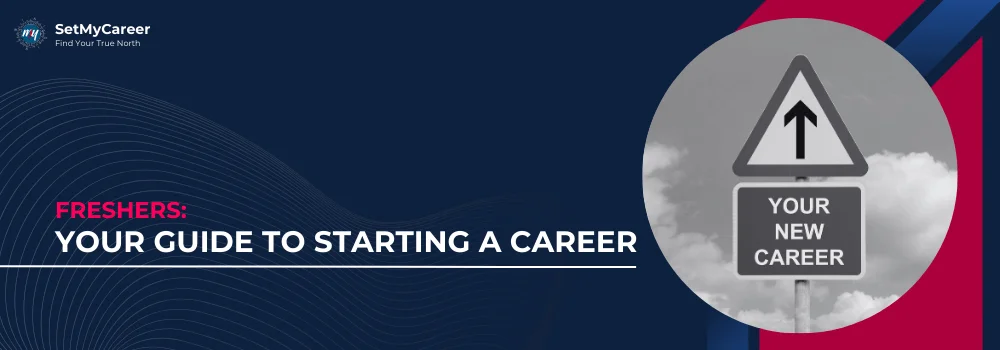
Published by Dr. Nandkishore Rathi on 12 March 2025
Chief Career Navigator
Dr. Nandkishore Rathi is passionate about identifying people's passions and helping them create and lead successful and fulfilling careers. With 30+ years of experience and interactions with thousands of students, academicians, and corporate executives, he has developed a range of career services aimed at benefiting individuals seeking a breakthrough in their professional lives.
A step-by-step guide to finding, landing, and growing in your first job.

Welcome to the beginning of your professional journey! Whether you’re fresh out of college or making a career transition, stepping into the job market can feel overwhelming. But don’t worry—we’re here to break it down step by step, from understanding job creation to acing your first interview and beyond.
Ever wondered where jobs come from? It’s not just companies posting vacancies—job creation is a result of economic growth, industry demand, and technological advancements. Sectors like IT, healthcare, and e-commerce have seen significant job growth while emerging fields such as AI, renewable energy, and fintech are expanding rapidly. Government policies, startup ecosystems, and foreign investments also influence the job market. Understanding these trends can help you align your skills with industries that create more jobs for freshers.
Tech-Driven Roles: The rise of AI, cloud computing, and cybersecurity is creating demand for specialized skills.
Gig Economy: Short-term contracts and freelance opportunities are growing, offering flexibility but requiring adaptability.
Sustainability & Green Jobs: As companies focus on environmental impact, roles in sustainability and clean energy are gaining traction.
Remote & Hybrid Work: Post-pandemic shifts have made remote roles more accessible, but they require digital proficiency and self-discipline.
If you’re just starting out, here’s what you need to know:
Entry-Level Salaries: Salaries vary by industry. Freshers in IT can expect ₹3-6 LPA, while marketing roles start around ₹2.5-4 LPA. Sectors like finance and consulting offer ₹5-8 LPA for top candidates.
Growth Potential: You can increase your earnings by upskilling, earning certifications, and gaining hands-on experience.
Top Job Search Platforms: Leverage platforms like Naukri, LinkedIn, Internshala, Apna, and Indeed to explore fresher opportunities.
Skill-Based Hiring: Companies are increasingly valuing skills over degrees, so focus on building practical experience through internships and certifications.
Securing your first job takes strategy, persistence, and a structured approach. An overview on how to go about this, step wise will look something like this.
Networking: Actively connect on LinkedIn, attend events, and engage in professional networking to boost visibility.
Resume & Cover Letter: To optimize your career toolkit, understand the distinction—a resume summarizes skills and experience, while a cover letter personalizes your application. Tailor both for each job, using quantifiable achievements and keywords from job descriptions.
Applications & Follow-Ups: Apply consistently, track applications, and follow up on promising leads using job trackers or spreadsheets for the organization.
Interview Preparation: Research industry-specific questions, practice mock interviews, and refine responses to learn how to face an interview confidently.
Upskilling & Certifications: Identify skill gaps from job postings and take relevant courses or certifications to improve employability. Enroll in relevant internships and training courses.
Building an Online Presence: Optimize LinkedIn, showcase work on GitHub (tech roles), or create an online portfolio to enhance credibility and attract recruiters.

You are missing 6 key strategies—learn how to stand out and get hired faster!
Get Hired NowChoosing a job isn’t just about salary—it’s about alignment with your skills, interests, and long-term goals. Here’s how to approach it:
Self-Assessment: Identify your strengths, interests, and career goals through methods like a psychometric test for career guidance.Experts posit that individuals who undergo self-assessments are considerably more likely to choose careers that lead to higher job satisfaction and performance.
Job Research: Utilize multiple research techniques, to explore the market and find the right fit for yourself. Analyze in depth your career goals. Use job platforms and sites, follow industry reports and trends and conduct in-depth research using interviewing or job shadowing methods.
Work-Life Balance: Evaluate factors like work hours, remote options, job flexibility, commute time, and industry expectations. In real world cases, employees with better work-life balance report higher productivity and lower burnout rates. Ensure your career choice aligns with your preferred lifestyle and well-being priorities to sustain long-term job satisfaction and performance.
Your resume should highlight your skills, internships, and project experience. Keep it concise — CV writing for freshers typically stays within 1-2 pages. Use action words to describe achievements. A career toolkit, including a resume, cover letter, and LinkedIn profile, will boost your chances.
Recruiters often spend only 6-7 seconds scanning a resume, so making it ATS-friendly Applicant Tracking System by using relevant keywords and a clean format significantly improves your chances of getting noticed. Craft a structured document highlighting education, skills, internships, and projects relevant to your career choice.
Research the Company: Know its mission, values, and recent developments.
Practice Behavioral Questions: Use the STAR technique (Situation, Task, Action, Result) to structure responses.
Dress Professionally: Even for virtual interviews, professional attire creates a good impression.
Follow-up: Send a thank-you email to express gratitude and reinforce your interest.
What makes you desirable to recruiters after graduation? Sure you have a striking resume but what gets you noticed? – Professional Networking opens doors to job opportunities that aren’t publicly advertised. Here’s how to build your network:
Attend Career Fairs & Webinars: Connect with recruiters and industry experts.
Engage on LinkedIn: Familiarize yourself with LinkedIn Optimisation of your profile. Share relevant insights, comment on posts, and join professional groups.
Leverage Alumni Networks: Reach out to graduates from your university for guidance.
Cold Emailing Works: Reach out to professionals for informational interviews. Keep it short, genuine, and specific.
A degree isn’t always necessary to land a well-paying job. Many lucrative careers don’t require a traditional degree but instead focus on skills and certifications.
Digital Marketing (₹3-7 LPA)
Graphic Design (₹2.5-6 LPA)
Cybersecurity Analyst (₹4-10 LPA with certifications)
Web Development (₹3-8 LPA)
How to get started:
Enroll in Certifications: Platforms like Coursera, Udemy, and Google Career Certificates offer affordable courses.
Build a Portfolio: Showcase projects, freelance work, or internships.
Use Skill-Based Job Platforms: Fiverr, Upwork, and Toptal offer freelance gigs that build experience.
Starting your career as a fresher can be challenging, but with the right strategy, research, and networking, you can find fulfilling opportunities. Set high career goals, keep upskilling, stay adaptable, and make informed decisions. Your journey to a successful career starts now!
No. 14/595, 1st Floor, Nanjappa Reddy Layout, Koramangala 8th Block, Bangalore 560095